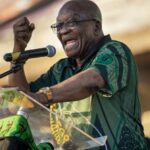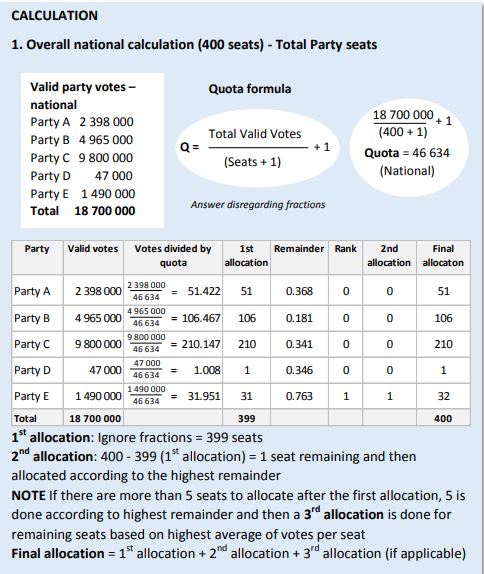
Zuma’s MK ends ANC’s governing dominance, EFF lists coalition demands » Capital News
NAIROBI, Kenya, Jun 1 — Former South African President Jacob Zuma’s five-month-old outfit uMkhonto weSizwe (MK) party has ended the ruling African National Congress (ANC) 30-year governing dominance following Wednesday’s national election.
Tallies from 23,116 voting districts out of 23,292 saw the Cyril Ramaphosa-led ANC registering 6.4 million votes at 40.25 per cent, denying the ruling party the 50 per cent majority required to govern.

Zuma’s outfit exceeded expectations displacing Julius Malema Economic Freedom Fighters (EFF) from third place after the Democratic Alliance (DA) a position it has held since its debut in national politics in 2014.
The Zuma-led outfit had garnered 2.3 million votes (14.66 per cent) behind South Africa’s main opposition DA which had secured 3.4 million votes (21.7 per cent) as tallying entered final stages on Friday.
MK emerged on top in ANC’s traditional base of KwaZulu-Natal which is Zuma’s home region.
Reacting to the provisional figures, Malema’s EFF welcomed the election outcome hailing South African voters for ending ANC’s absolute majority in Parliament.
EFF demands
He said EFF was willing to engage in coalition talks with ANC listing key time-bound demands including a constitutional amendment and land reforms.

Malema further demanded the ANC offer House Speakership in addition to Cabinet slots.
“We will not determine who ANC picks just like they must not determine who we want on our side,” he told a news conference.
Malema ruled out a unity government involving more parties saying: “I am not Nelson Mandela”.
The coalition government will mark the first time ANC has missed the 50 per cent threshold since sweeping to power at the end of apartheid in 1994 under Nelson Mandela, the country’s first black leader.
A party requires 201 seats in the National Assembly to pick the country’s President and form a government. Failure to garner a clear majority forces a party to garner support to cover the deficit.
ANC performance in the 2024 election marked its worst fall yet having declined from 62 per cent in 2014 to 57.5 per cent in 2019, a shift that cost it nineteen seats in the National Assembly to settle for 230 even as EFF grew from 25 seats in 2014 to 44 in 2019.
ANC’s 2014 performance when Malema’s EFF made its debut marked a decline from 65 per cent in the 2009 election.
Quota system
The party registered its highest performance in 2004 under Zuma when it won 69.7 per cent of the vote up from 66.4 per cent in 1999, and 62.7 per cent in 1994.

South Africa has a parliamentary system of government where the Independent Electoral Commission (IEC) computes seats for parliamentary parties based on a quota system pegged on each party’s performance in the national election.
IEC divides the number of valid votes cast by the number of available seats (400) in the National Assembly to determine the number of votes a party needs for a single seat.
A party needed 45,000 votes for a single seat in the House in 2014 and fell to about 44,000 in 2019 after the voter turnout dipped by about 7 per cent.
